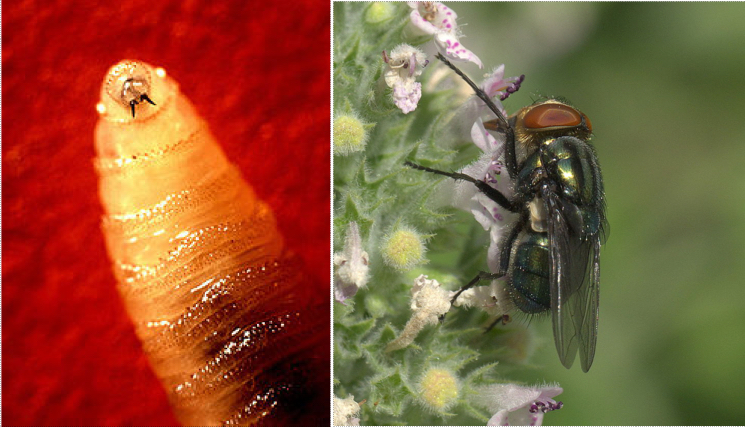National Key Deer Refuge Responds to Screw Worm Infestation / Eighty Key Deer Have Died To Date
The National Key Deer Refuge (NKDR) is currently working with international, federal, state and local authorities to eradicate the New World screwworm from the lower Florida Keys. Eighty Key Deer have died as a result of the infestation thus far.
Screwworms are fly larvae (maggots) that can infest warm-blooded animals. They enter an animal’s skin, usually through an open wound and feed on living tissue. Screwworms were eradicated from the U.S. in the 1960’s, but their presence on the refuge was confirmed on September 30th when larvae from an infected Key deer were identified by University of Florida pathologists and confirmed by the National Veterinary Services Laboratory.
Q&A
Q: How is screwworm impacting the Key deer population?
A: All ages and sexes of Key deer can be infested by screwworms; however, we are currently seeing males being infested as a result of injuries incurred from confrontations with other males during the mating season. The infestation has resulted in the mortality of at least 80 Key deer to date.
Q: Why are Key deer infested with screwworms being euthanized?
A: Screwworm infestations of Key deer are difficult to detect in the early stages; those being reported to the Key Deer Hotline are typically so severely infested that they cannot be effectively treated or rehabilitated. Therefore, euthanasia is employed to humanely end their suffering; otherwise the extent of the injuries caused by the maggots will ultimately lead to a slow, painful death.
Q: What strategies are being implemented to help protect Key deer and other wildlife?
A: Screwworms have previously been successfully eradicated by releasing sterile male screwworm flies in affected regions. Since the female screwworm fly only mates once before death, if she mates with a sterile male her eggs won’t hatch. Visit www.FreshFromFlorida.com/Screwworm for more detailed screwworm lifecycle information. T
This week the first sterile males were released on Big Pine and No Name Keys. These bi-weekly releases will continue until the screwworm is eradicated, a process that may take several months.
The U.S. Fish and Wildlife Service is also evaluating several other potential options, such as the use of avermectins to prevent healthy Key deer from getting sick; however, the use of this and other pesticides on refuge lands is strictly regulated as consequences to other threatened and endangered wildlife species and ecosystem health must be fully considered.
Q: What can I do to help Key deer?
A: There are a number of things you can do to help. Help us spread the word about this infestation.
Report any suspected infected Key deer to the Key Deer Hotline (305-470-6863, ext 7). Please drive carefully, Key deer are in the middle of the rut (mating season), and driven by hormones and instinct, they are interacting by fighting, mating and generally running around without much concern for traffic.
Please do not feed Key deer. Attracting large numbers to feeding stations can lead to fights between deer, causing wounds that are susceptible to screwworm. Deer congregating in groups may also promote the spread of this infestation and other diseases. It is unlawful to feed Key deer.
Q: What happens after I call the Key Deer Hotline?
A: Once a call is received, the Hotline operator (a professional Florida Fish and Wildlife Conservation Commission [FWC] dispatch officer) immediately contacts Refuge law enforcement or biological program staff, who are on-call 24 hours a day to respond to deer calls. FWC dispatch forwards information on the location, any known status of a key deer, as well as contact information for the caller to the responder. Refuge staff respond as quickly as possible. FWC, USDA and Monroe County Law Enforcement Officers are also assisting in the response effort.
Responders will attempt to locate the reported deer, given the information provided through the dispatch. The responder may contact the caller if a deer cannot be located, or if further information is needed. Once a deer has been located, a health assessment is conducted to determine the extent of injuries or infestation that may be present. If the injury or screwworm infestation is deemed to be treatable, the responder will attempt to treat on-site. If the injury or infection has progressed beyond treatment and it is determined the animal will likely perish on its own, or it appears to be in severe pain or distress, the animal is humanely euthanized to prevent further suffering. Information collected on the injury or infestation is evaluated by Refuge biologists and others to continually monitor the health of the herd.
Q: What should I do if I think my pet has screwworm?
A: Contact your local veterinarian immediately. Injuries are completely treatable if caught early. You may also contact 1-800-HELP-FLA if you have any questions about screwworm on domestic pets or livestock. Visit www.FreshFromFlorida.com/Screwworm for more screwworm information.
For more information, please contact Dan Clark at 305-872-2239 ext. 209, Kristie Killam 305-304-9625 or Kate Watts at 305-872-2239 ext. 227 and follow Refuge updates on our website and Facebook page:
www.fws.gov/refuge/National_Key_Deer_Refuge/
www.facebook.com/floridakeysrefuges
The National Wildlife Refuge System protects wildlife and wildlife habitat on more than 150 million acres of land and water from the Caribbean to the Pacific, Maine to Alaska. Refuges also improve human health, provide outdoor recreation, and support local economies. Visit our home page at http://www.fws.gov/refuges/.
The mission of the U.S. Fish and Wildlife Service is working with others to conserve, protect, and enhance fish, wildlife, plants, and their habitats for the continuing benefit of the American people. We are both a leader and trusted partner in fish and wildlife conservation, known for our scientific excellence, stewardship of lands and natural resources, dedicated professionals, and commitment to public service. For more information on our work and the people who make it happen, visit http://www.fws.gov/.
[gview file=”https://thebluepaper.com/wp-content/uploads/screwwormQAexternal_FINAL.pdf”]


